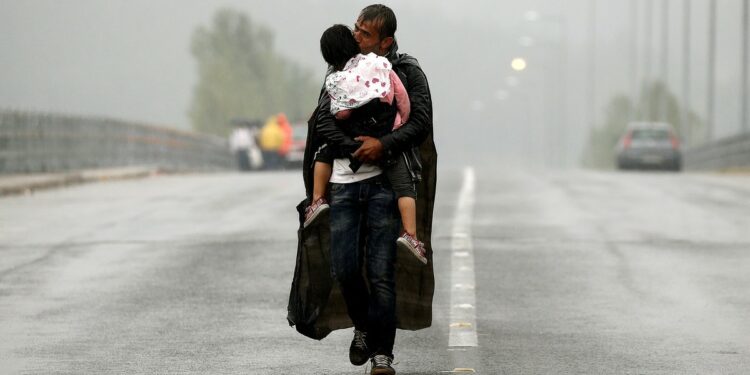The arrival of more than 1 million migrants in Europe in 2015 transformed the region’s political landscape. Four years later, the numbers seeking refuge have fallen sharply—even if the rhetoric surrounding the newcomers has not.
European Union data released Thursday showed that the number of first-time asylum seekers in the bloc declined for the fourth straight year. It now stands at 580,800, just above the number that arrived in 2014, the year before the migrant crisis began.
These latest figures are significant not because a semblance of order has been restored to those countries that account for the main source of asylum seekers—Syria, Afghanistan, and Iraq remain in various stages of tumult—but because migration remains a potent rallying call for far-right and populist parties that continue to use the issue to mobilize voters ahead of European Parliament elections in May. Additionally, European governments have tightened their rules not only for immigration but also for asylum, resulting in a steep decline in approval rates, according to separate European data.
Still, the numbers released Thursday are unlikely to placate the plurality of Europeans who say they believe immigration is the most important issue facing the bloc. Indeed, the arrival of large numbers of migrants four years ago fostered a belief that EU governments had lost control of the bloc’s borders, bolstering support for parties that until then had occupied the fringes of European politics. That has changed markedly, though: Populist parties are expected to make significant enough gains in the upcoming polls to put a major dent in the four-decade-long electoral dominance of the EU’s centrist parties—a repeat of the pattern seen in an array of national elections across Europe.
Many of these parties are skeptical of the EU itself, but particularly of the bloc’s migration policies. Some of that skepticism has been a centerpiece of government policies in Italy, Austria, and elsewhere. Italian Deputy Prime Minister Matteo Salvini’s opposition to immigration, for instance, has helped ensure that fewer migrants are making the perilous journey across the Mediterranean to Italy, the previously favored destination. Italy saw a 61 percent decline in the number of asylum seekers, according to the EU data. (Left-wing parties that call for more immigration, such as Germany’s Greens and Sweden’s Left Party, have also made significant gains, but are not part of governments in their countries.)
Europe’s traditional center-right and center-left parties are not blind to the prevailing political winds. Rejections of asylum applications outnumbered approvals by a two-to-one margin last year, according to the European Asylum Support Office. (In 2015, one in two applications was successful.) Germany, whose open-door policy for Syrians fleeing the civil war sparked the flow of migrants into Europe and consequently saw a far-right party enter Parliament for the first time since World War II, has tightened its rules—though it remains the top destination for asylum seekers. Berlin has sped up how it makes decisions on asylum requests, a process that in theory also speeds up the deportation of those whose claims are denied. Additionally, Berlin now deems Afghanistan a safe country, meaning Afghans seeking refuge in Germany are no longer assured of it.
Annegret Kramp-Karrenbauer, the head of Chancellor Angela Merkel’s governing Christian Democratic Union, recently said Germany “must make sure nothing like” the surge of Syrian migrants “ever happens again.” Sweden and other countries are also rethinking their relatively liberal humanitarian migration policies in the face of public backlash.
A fundamental challenge for the bloc is its piecemeal policy on asylum. Prior to the crisis, the so-called Dublin rule, which mandated that migrants seek asylum in the country where they first arrive, appeared to be sufficient to handle the relatively low number of claims. But that fractured when hundreds of thousands of migrants from Syria and elsewhere began arriving in Italy, Greece, Spain, and the frontiers of eastern Europe to make their way west.
Since then, the EU has tried to forge a common asylum policy, but with no real success. One major stumbling block is whether Brussels can enforce a quota that distributes refugees among the bloc’s members so the Mediterranean states in particular don’t bear an unfair burden. Governments in countries such as Hungary, which have been vocal about their opposition to migrants in general and Muslim migrants in particular, have adamantly opposed this plan.
Yet while migration and asylum continue to dominate Europe’s politics, the numbers show that the issue is not as pressing as it once was.
Source link : https://www.theatlantic.com/international/archive/2019/03/europe-refugees-syria-borders/585097/
Author :
Publish date : 2019-03-16 07:00:00
Copyright for syndicated content belongs to the linked Source.



